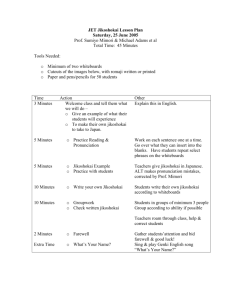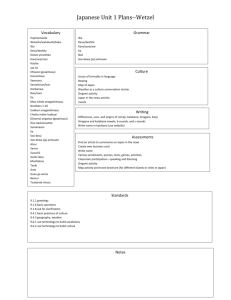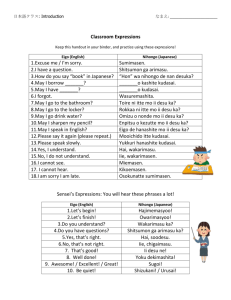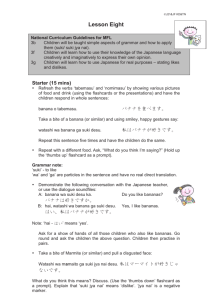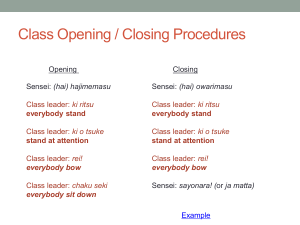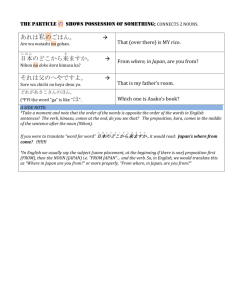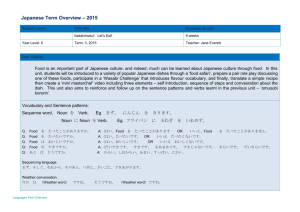Fit in and Make Friends - Several surefire phrases to help your
advertisement
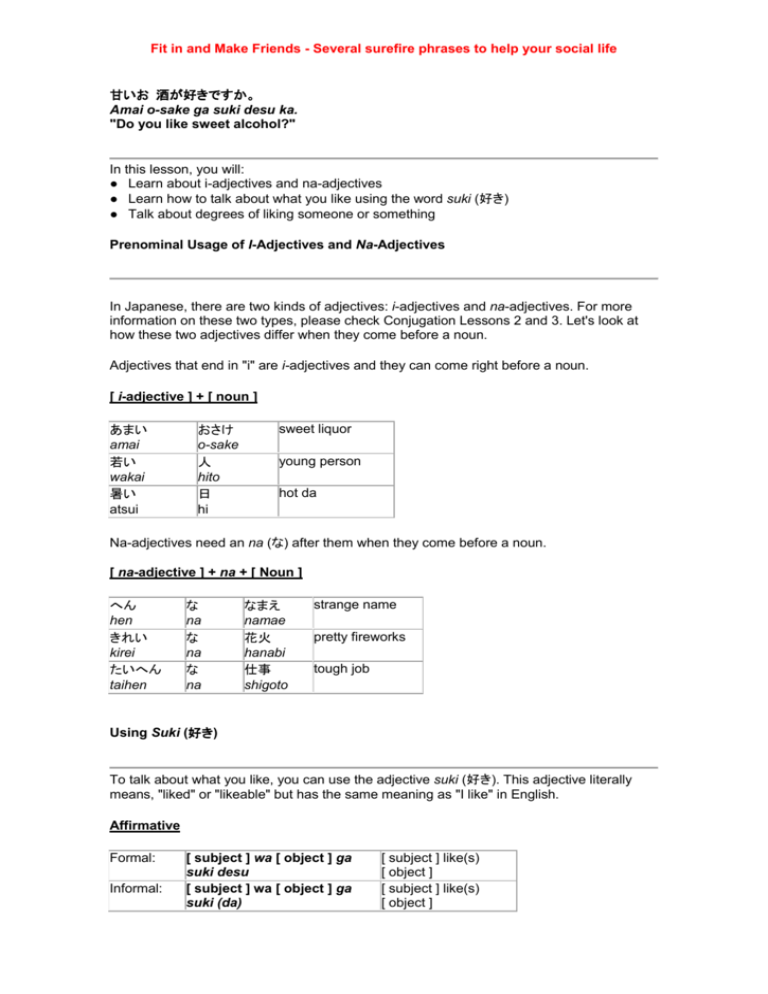
Fit in and Make Friends - Several surefire phrases to help your social life 甘いお 酒が好きですか。 Amai o-sake ga suki desu ka. "Do you like sweet alcohol?" In this lesson, you will: ● Learn about i-adjectives and na-adjectives ● Learn how to talk about what you like using the word suki (好き) ● Talk about degrees of liking someone or something Prenominal Usage of I-Adjectives and Na-Adjectives In Japanese, there are two kinds of adjectives: i-adjectives and na-adjectives. For more information on these two types, please check Conjugation Lessons 2 and 3. Let's look at how these two adjectives differ when they come before a noun. Adjectives that end in "i" are i-adjectives and they can come right before a noun. [ i-adjective ] + [ noun ] あまい amai 若い wakai 暑い atsui おさけ o-sake 人 hito 日 hi sweet liquor young person hot da Na-adjectives need an na (な) after them when they come before a noun. [ na-adjective ] + na + [ Noun ] へん hen きれい kirei たいへん taihen な na な na な na なまえ namae 花火 hanabi 仕事 shigoto strange name pretty fireworks tough job Using Suki (好き) To talk about what you like, you can use the adjective suki (好き). This adjective literally means, "liked" or "likeable" but has the same meaning as "I like" in English. Affirmative Formal: Informal: [ subject ] wa [ object ] ga suki desu [ subject ] wa [ object ] ga suki (da) [ subject ] like(s) [ object ] [ subject ] like(s) [ object ] Examples: 1. 私はねこが好きです。 Watashi wa neko ga suki desu. "I like cats." 2. 豊田さんはお酒が好きです。 Toyota-san wa o-sake ga suki desu. "Mr. Toyota likes alcohol." Question Formal: Informal: [ subject ] wa [ object ] ga suki desu ka? [ subject ] wa [ object ] ga suki? Does [ subject ] like [ object ]? Does [ subject ] like [ object ]? Example: (アシュリーさんは)甘いお酒が好きですか。 (Ashurī-san wa) amai o-sake ga suki desu ka?. "Ashley, do you like sweet drinks?" Degrees of Liking/Not Liking Something Let's look at some different words that indicate different degrees of liking/not liking something. In these examples, we assume that the subject is "I." "I love [object]" [object] が だいすき (で す) [object] ga daisuki (desu) "I like [object]" [object] が すき (で す) [object] ga suki (desu) "I don't like [object]" [object] が すきじゃない (で す) [object] ga suki janai (desu) [object] が すきじゃありません [object] ga suki ja arimasen [object] が きらい (で す) [object] ga kirai (desu) [object] が だいきらい (で す) [object] ga daikirai (desu) Examples: 1. てんぷらが大好きです。 Tenpura ga daisuki desu. "I love tempura." 2. お酒が好きじゃないです。 O-sake ga suki ja nai desu. "I don't like alcohol." 3. うそがきらいです。 Uso ga kirai desu. "I hate lies." Vocab Usage "I hate [object]" "I really hate [object]" In the dialog, we saw the word amai (甘い), which means "sweet". Let's take a look at some more vocabulary used for describing taste. 甘い amai sweet しょっぱい shoppai salty すっぱい suppai sour 辛い karai spicy 苦い nigai bitter So What IS Sake? Many English speakers are familiar with the word "sake," which we use in English to talk about Japanese rice wine. In Japanese, the word sake, or o-sake, as it is commonly known with the polite prefix o- added, refers to alcohol in general. Japanese rice wine that is known as "sake" in English is called Nihon-shu in Japanese. It's important to note that in Japan, alcohol is a big part of socializing, especially in the business world when going out with co-workers or clients. If you would rather not drink, don't hesitate to refuse by saying O-sake, dame desu (お酒、だめです) which literally means "Alcohol is no good," but comes across as "I don't drink alcohol." Fireworks Fireworks festivals, known as hanabi taikai (花火大会) in Japanese, are very popular events that are held in the summer throughout Japan. Major fireworks festivals draw crowds of thousands of people, and unless you go early and reserve a space, it can sometimes be hard to find a place to sit and enjoy the fireworks! Many people go in big groups with friends, family, or co-workers, and it is common to eat and drink as you sit and watch the fireworks. The word for fireworks, hanabi (花火), is made up of the words for "flower" and "fire."
